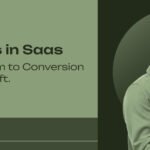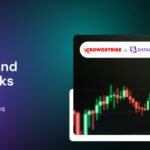Irrespective of a virtual or an offline event, converting attendees into leads is the ultimate intent. But how can you accomplish that in an era of omnichannel marketing?
A lot goes into an event, from vigorous planning, investing, and resources to managing expectations. You work hard organizing an ideal event, deciding the location, shortlisting the attendees, and putting everything together. When the day finally arrives, you eagerly check the registration desk, keeping an eye on the number of event lead.
But here is the thing. Even if you have a large turnout, it doesn’t mean they will convert into leads. There could be scenarios when you have a good turnout, yet no lead conversion!
And there could be several reasons for this. Let’s not forget event lead generation is a critical aspect of an event marketing program. What’s important is to identify ways to convert the attendees into leads. In this article, we will cover all the essential pointers that will help you ace your next event and bag those target accounts.
How Event Marketing Fuels B2B Lead Generation?
85 % of B2B marketers depend on lead generation to grow their client network reinforcing why lead generation remains a core pillar for growth in 2026. Event marketing can pave the way for attracting more clients to your business. The main agenda behind planning events like conventions, trade shows, and product demos is to connect with your customer base and acquire event leads. It also allows you to showcase your brand expertise and how you will resolve audience pain points. Here’s how hosting events can benefit your business.
Enhances Communication with Prospects
When you speak to your audience through virtual communication or in-person events, it enables them to put a face to the brand. Direct interaction strengthens the bond between customers and your brand. It’s far more effective than them reading a blog or post about your brand. Presentations are also a means to engage with the audience and involve their views and opinions. It allows a free flow of conversations and provides scope to address their questions.
Attracts clients through word of mouth
Audience engagement on social media and at the event can be measured with metrics but how will you know the customer’s perception of your brand? Word-of-mouth can increase audience reach, and the way to go is to launch an event that generates a response. You can also find bloggers who would write about your brand or a particular event. If people like the events and connect with your brand, they will talk to others, bringing you more customers. The more people talk about your brand, the more leads you generate.
Online Events for Event Lead Generation
A hybrid or virtual event usually attracts a broad client network, increasing your chance of acquiring more leads. It opens up opportunities to get a global audience miles away from your location. What gives these an added advantage is you can record them. You can share glimpses of the recording on your social media. The entire webinar video could be available on your website for users to subscribe and download. In this way, you increase your outreach.
Event Lead Generation Strategies
While organizing/attending an event, you must be proactive throughout the event lifecycle. Whether you are hosting a webinar or an offline event, it’s vital to act. Integrating these with broader B2B lead generation strategies ensures your event isn’t operating in a silo.
Focus on identifying the high-value accounts and implement these steps to get them on board.
1. Networking
We cannot emphasize the word ‘network’.
You have organized an event, and the attendees have shown up. Talk to them, connect, understand them better, and mention key features of your brand. When you interact with prospects, you develop strong relationships with the potential to convert into leads.
Exchanging contact details creates a bridge for an interested clientele to reach out to your brand.
2. Performing lead scoring on-site
We know you would be crunched for time, checking the attendee list and making sure all is perfect. But without a lead score, the event is less likely to give you the desired outcomes. To ensure accuracy, your team should be trained on specific B2B lead scoring criteria and examples before the doors even open.
The best way is to start scoring leads right after you talk to the prospects. You can build a system that makes it easier for you to track the conversations and the list of priority prospects. Then, you can assign each customer a score out of 10, a higher score representing a high interest in doing business with you and vice versa.
3. Take Notes
Lead qualification can seem cumbersome, especially if sales reps don’t add any lead context. Detailed
What often happens is that the sales rep of the event and the account executive who contacts prospects later are different people. This is why it is a good idea to maintain notes for each lead captured.
It could also be used as a reference sheet for others to follow up with prospects.
Notes are the difference between a generic contact and highly qualified leads that are ready for the final sales push.
4. Social Media Marketing
The world has gone digital, and social media is no exception. Before launching an event, create a social media presence. Once the event is wrapped up, you can promote the highlights or live streams on channels your prospects frequent.
After an event, reach out to them through messages on social. Such prompt actions can drive more organic leads.
5. Referral Marketing
This approach relies on the network of existing customers and their credibility to attract new ones. Do not hesitate about the idea of asking prospects to put in a few good words for your business to their colleagues and contacts.
A referral can enhance brand awareness and improve the probability of closing deals.
6. Share relevant information
While talking to your prospects, shelling out general information about your business may not get you far. The objective is to convey how your business will address their concerns and why they should preferably choose your offerings.
When preparing the list of invitees, research the clientele and keep some key points at hand. Include some of these in the event presentation or brief.
When prospects can resonate with your brand, it shifts their perspective on the business, promoting the sales cycle.
7. Use Sales Enablement Tools
Interactive content like brochures videos or podcasts highlighting features about the company can be a great tool for lead capture. What you cannot communicate through conversations, such content does so in your favor.
Videos and podcasts can explain the offerings more engagingly. The sales reps should always have relevant resources at hand. You could also arrange for a screen displaying the features of the brand. Visual content can create a lasting impact on the clients, promoting brand authority
8. Conduct performance analysis
While using event strategy as a part of your marketing plan, allot time and resources toward performance analysis. Track the responses you received on social media and the website engagement.
And maintain a record of the engagement, including audience queries, and evaluate the statistics. This will give you enough data to plan your strategy forward from there.
9. Follow-up with Event Leads
Following up with a lead after the event will act as a catalyst for lead generation.
It is equally important as the event itself, and you must make the most of it. But promptness is a must-have when it comes to following up; any delay would dilute the purpose. Mastering your ‘speed to lead‘ post-event is what prevents hot prospects from cooling off.
Follow-up emails are an opportunity to share additional resources, links, and any relevant data that would strengthen the brand image.
10. Always have a Plan B in your Pocket
An event can bring a mix of outcomes.
It can all swing in your favor, or there may be surprises. For instance, the high-value prospect you were looking forward to closing a deal with may decide not to attend the event. Or you may experience a smaller turnout than expected.
A backup plan will help you in such circumstances. Instead of relying on plan A, design a solid contingency plan to come out strongly irrespective of the event outcomes. It could be as simple as emailing the target prospects and sending them a link to the event.
Best Types of Events to Generate High-Quality Leads
A B2B event only comes to fruition if it’s organized and run with a purpose in mind. What is the goal of the specific event you’re organizing? Are you building brand awareness or hoping to generate high-quality leads?
The brand’s overall objective is what your event’s success boils down to. Because every event you organize is aimed at extracting a single outcome. Once you’ve an intent in mind, that’s where you begin with organizing your B2B events for lead generation.
But which type of events will actually help you collate high-quality, intent-driven leads? Choosing the right stage for your brand matters.
Here are some of the event formats that can reap wonders for your B2B lead gen strategy-
1. Conferences
Conferences are the norm and the cliché of the business world. But only because they actually work wonders for your brand.
It’s an elaborate event that brings together business leaders, thought leaders, and industry professionals under a single roof. Imagine the extent to which you’re introducing your brand, targeting the crème de la crème of the business world.
Not only can you network and build relationships, but you can also host panel discussions to exchange opinions. It’s a great way to position yourself as a subject-matter expert in front of other experts. For those in specialized sectors, this is the perfect stage for thought leadership for Fintech or other complex industries.
But for effective lead gen, you can’t just exchange business cards. Cards are often lost, and don’t hold much substance. But a lead capture app might do the trick, only after you’ve discerned who fits your ICP.
When you scan the attendees’ badges or business cards, you already receive a stacked and organized list of leads you’ve captured. They can be segmented according to their need level- from cold to urgent, such that they are acted upon as soon as possible.
Once done, you can outline what sort of partnership this could turn out to be. And whether the lead has the wavelength for a meeting to discuss potential sales.
2. Networking Events
Networking events take place in a professional setting, but they make space for socializing. There’s not a rigid schedule, such as a conference, where business leaders must move from one discussion to another.
Networking events are more flexible and casual. Think of cocktail dinners or speed networking events- the goal is always to build relationships and familiarity, and convert these into leads.
But according to the time and agenda, most marketers opt for quantity over quality. That’s not what will get you those conversions.
Focus on the quality. Don’t just stand there collecting as many business cards as possible. What’s the point if none of them remember who you are? So, pivot to making meaningful conversations. Listen to others, grasp their pain point, especially in the light of current market disruptions.
Start with a specific theme that’s common to both parties, or leverage icebreakers. Instill humor. And know the person in front of you; don’t sit down to discuss business.
Networking skills that work always equate to memorable experiences.
3. Online Workshops
Connecting with everyone at the base level, and specifically face-to-face, isn’t quite possible. But digitization has afforded us the means to reach audiences even on the other side of the globe.
Online workshops and training are the best way to do so for B2B businesses. Over 73% of marketers say that webinars are the most cost-effective means of generating high-quality leads.
And they work as a double-edged sword. These sessions don’t just offer you the advantage of creating awareness, but also position your brand as a credible authority.
To effectively capture intent-driven leads, you must clearly illustrate your intent. Begin here- with robust and strategic event promotion.
Tap into your social media, email marketing campaigns, and existing partnerships to reach as many people as possible. And then incentivize registration by offering access to an eBook or a whitepaper in exchange for contact details.
And then comes the day of the event.
Curate webinar content that informs and educates. One that delivers value and is actionable. You can highlight common industry pain points and offer practical solutions that could work for them in the short term.
This way, you deliver value up front.
Consider holding a Q&A session to engage the participants. It shouldn’t feel like a lecture or a monologue, but a dialogue. Given the conversation these create, online events such as webinars have become an industry staple.
4. Trade Shows
Trade shows are basically extensive gatherings where industry-specific businesses come together to illustrate their offerings.
And this works well for both B2B and B2C businesses, making it a versatile medium for B2B lead generation.
But successful trade shows are strategically planned and executed, from designing eye-catching booths to curating engaging pitches. You must stand out, be unique in a sea of businesses offering similar solutions. So, you must inculcate interactive elements and build upon your own brand identity to maximize visibility.
The point is: engagement and captivation.
It’s not about selling, but building interest and awareness. That’s what trade shows boil down to. The more you promote your booth, the more visibility your brand receives. And given that the exhibition is industry-specific, those with the right intent might actually end up at your booth.
So it’s all about offering unique experiences face-to-face, to convert later.
One of the other vantage points of trade shows is that they highlight the actual level of competition. And spotlights your position in the market, allowing you space to expand your reach.
Selecting the Best Event Lead Capture Tool for 2026
Beyond just capturing names, successful firms are now funneling this event data into proprietary databases for B2B lead generation to build long-term market intelligence. Event marketing planning also comprises deciding which lead capture tools to use for contact collection and management. It’s the primary step to a genuine and timely lead follow-up and qualification.
Without a robust tool, you’re left sorting through contacts that end up nowhere. Even the most staple method of contact collection, i.e., scanners, can end up clunky and expensive.
With this, phones have become the go-to for marketers. Your notes app may work all too well. But still, here are some lead capture tools that can help you streamline all business cards and contacts to ensure seamless lead nurturing later.
A. iCapture

Source: iCapture
iCapture offers precisely what is expected from the lead retrieval process- ease, convenience, and connection. It’s an intelligent capture and retrieval software for marketers who need both.
The best part of this platform is that it works offline and online. It can be proactively used to scan business cards and trade show badges.
But this app doesn’t rely on OCR, or Optical Character Recognition. It scans the card and sends the details to an actual human, who then transcribes and verifies the data on their end. However, there’s actually no manual work required, such as paper forms or importing CSV files.
The app itself organizes the attendee data in spreadsheets that you can easily access on their website and then sync with your CRM.
iCapture is best for B2B marketers who are running live activations across ground-level events.
B. Popl

Source: G2
With Popl, you don’t need to carry business cards, and neither do your attendees. Marketers can send their contact details directly through the app to avoid missing out on any opportunities.
What most customers go for is ease of use. This is what Popl caters to by allowing users to collate their websites and socials, all in one place. You can share your contact details, company name, and social links with just a single tap.
The tool makes networking easier, especially when you’re amidst a crowd and crunched for time. It’s professional, quick, and convenient. It helps keep track of all contacts without having to manually enter details.
Popl is a pro at capturing leads right off the bat, and it saves marketers from the hassle of going through multiple steps. Following up is also seamless with its CRM integration, making it a game-changer in the networking and lead capture space.
C. Whova

Source: Whova
Whova is a comprehensive, all-in-one event management platform. It takes care of every tidbit across the entire event lifecycle, from registration to follow-ups-
- Before: Event registration, event webpage management, call for speakers and abstracts, and event promotions.
- During: Networking, check-in, exhibitor lead retrieval, etc.
- After: Event summary, post-event report, and lead follow-up (‘thank you’ messages).
And the best aspect of this app? You can customize it with your own branding. This serves an excellent purpose to elevate brand awareness and visibility. The app continues its functions in the background while it gives leads exposure to your brand.
You can use search tags to filter out attendees based on interests and job titles. And even send/receive messages, get notifications, look at upcoming sessions, and add them to your agenda.
In simple words, Whova keeps you organized.
For its highly sophisticated and 360-degree functionality, Whova has been recognized as the best Event Management Tool for nine years straight. It has powered over 50k offline and virtual/hybrid events across the globe, and is evidently a market favorite.
B2B events are all about curating experiences that translate delivered experiences into valuable leads.
It’s what B2B marketers must keep in mind.
It doesn’t boil down to the venue or the logistics you have. But the experience you deliver, and how much time you afford your conversations with other industry leaders.
Conversations and dialogue- the hidden gem. That’s what truly drives lead generation through events.
Focus on clearly presenting your brand message and fostering a connection with the audience. Utilize their presence at your event to your advantage, and network as much as possible. And add a layer of efficiency by following up with prospects who showed interest.
When planning events, leverage them to generate and nurture leads. However, lead generation is an ongoing process that demands time and resources.
A robust strategy can empower an entire event and its outcomes.





